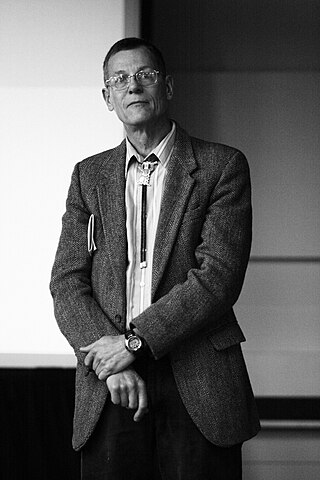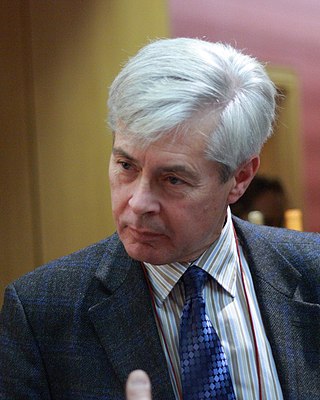
Herbert George Wells was an English writer, prolific in many genres. He wrote more than fifty novels and dozens of short stories. His non-fiction output included works of social commentary, politics, history, popular science, satire, biography, and autobiography. Wells' science fiction novels are so well regarded that he has been called the "father of science fiction".

Sir Julian Sorell Huxley was an English evolutionary biologist, eugenicist, and internationalist. He was a proponent of natural selection, and a leading figure in the mid-twentieth century modern synthesis. He was secretary of the Zoological Society of London (1935–1942), the first director of UNESCO, a founding member of the World Wildlife Fund, the president of the British Eugenics Society (1959–1962), and the first president of the British Humanist Association.

Televangelism and occasionally termed radio evangelism or teleministry, denotes the utilization of media platforms, notably radio and television, for the marketing of religious messages, particularly Christianity.
The Great Depression in the United Kingdom also known as the Great Slump, was a period of national economic downturn in the 1930s, which had its origins in the global Great Depression. It was Britain's largest and most profound economic depression of the 20th century. The Great Depression originated in the United States in late 1929 and quickly spread to the world. Britain did not experience the boom that had characterized the U.S., Germany, Canada and Australia in the 1920s, so its effect appeared less severe. Britain's world trade fell by half (1929–33), the output of heavy industry fell by a third, employment profits plunged in nearly all sectors. At the depth in summer 1932, registered unemployed numbered 3.5 million, and many more had only part-time employment. However at the same time, from 1929 to 1933 employment dipped only to 94.9% relative to 1929 employment metrics and recovery was seen as early at 1933. The positive trend continued across real national income and wages. New houses built increased by 33% from 1929 to 1933, while profits, prices, export volume and value, and imports volume and value dropped. Overall, while all these metrics were concerning to parliament and businessmen along with devastating industrial regions, the common person especially in areas around London did not experience major hardship and even prospered.

The Children's Encyclopædia was an encyclopaedia originated by Arthur Mee, and published by the Educational Book Company, a subsidiary of Northcliffe's Amalgamated Press, London. It was published from 1908 to 1964. Walter M. Jackson's company Grolier acquired the rights to publish it in the U.S. under the name The Book of Knowledge (1910).
Shona is a Bantu language of the Shona people of Zimbabwe. The term is variously used to collectively describe all the Central Shonic varieties or specifically Standard Shona, a variety codified in the mid-20th century. Using the broader term, the language is spoken by over 10 million people.

Edward Arthur Milne FRS was a British astrophysicist and mathematician.

Goldsworthy Lowes Dickinson, known as Goldie, was a British political scientist and philosopher. He lived most of his life at Cambridge, where he wrote a dissertation on Neoplatonism before becoming a fellow. He was closely associated with the Bloomsbury Group.

The Case-Book of Sherlock Holmes is the final set of twelve Sherlock Holmes short stories by British writer Arthur Conan Doyle first published in the Strand Magazine between October 1921 and April 1927.

Rudolf John Frederick Lehmann was an English publisher, poet and man of letters. He founded the periodicals New Writing and The London Magazine, and the publishing house of John Lehmann Limited.
The Thinker's Library was a series of 140 hardcover books published between 1929 and 1951 for the Rationalist Press Association by Watts & Co., London, a company founded by the brothers John and Charles Watts and then run by the latter's son Charles Albert Watts. The name was suggested by Archibald Robertson, a member of the company's board of directors, who took an active interest in setting up the series and was later to write several volumes himself. The Thinker’s Library was intended as a successor to the cheap paperback “Sixpenny Reprints” from the same publisher, the aim being to bring humanist, philosophical and scientific works to as wide an audience as possible. Unlike the previous series, the volumes in the Thinker’s Library were small hardbacks bound in brown clothette, with grey dustjackets, priced at one shilling. The covers of the early editions featured title, author’s name and a brief description of the book between Doric columns, with the image of Rodin’s The Thinker at the foot. The design would change several times over the course of the series, but the figure of the Thinker remained ever-present.

William Ball Provine was an American historian of science and of evolutionary biology and population genetics. He was the Andrew H. and James S. Tisch Distinguished University Professor at Cornell University and was a professor in the Departments of History, Science and Technology Studies, and Ecology and Evolutionary Biology.

Richard Bevan Braithwaite was an English philosopher who specialized in the philosophy of science, ethics, and the philosophy of religion.

Peter J. Bowler is a historian of biology who has written extensively on the history of evolutionary thought, the history of the environmental sciences, and on the history of genetics. His 1984 book, Evolution: The History of an Idea is a standard textbook on the history of evolution; a 25th anniversary edition came in 2009. His 1983 book The Eclipse of Darwinism: Anti-Darwinian Evolution Theories in the Decades Around 1900 describes the scientific predominance of other evolutionary theories which led many to minimise the significance of natural selection, in the first part of the twentieth century before genetics was reconciled with natural selection in the modern synthesis.
Arthur George Street, who wrote under the name of A. G. Street, was an English farmer, writer and broadcaster. A number of his books were published by the literary publishing house of Faber and Faber. His best-known book was Farmer's Glory, describing his time in Canada and how he returned to Wiltshire.

The Vanguard Press was a United States publishing house established with a $100,000 grant from the left-wing American Fund for Public Service, better known as the Garland Fund. Throughout the 1920s, Vanguard Press issued an array of books on radical topics, including studies of the Soviet Union, socialist theory, and politically oriented fiction by a range of writers. The press ultimately received a total of $155,000 from the Garland Fund, which separated itself and turned the press over to its publisher, James Henle. Henle became sole owner in February 1932.
John D. Craig (1903–1997) was an American businessman, writer, soldier, diver, Hollywood stunt man, film producer, and television host. He worked in the commercial surface-supplied diving industry from the 1930s on, and filmed aerial combat over Europe during World War II. He is best known for using film and television to show the United States public the beauties and dangers of Earth's underwater worlds.
Thomas Haining Gillespie FRSE FSZS was a Scottish solicitor, zoological administrator, and broadcaster. He was the founder of Edinburgh Zoo and of its parent organisation the Royal Zoological Society of Scotland. As a broadcaster on the children's radio programme Children's Hour he was known as "the zoo man", giving talks and answering questions on zoological matters.
This article is focused on English-language literature rather than the literature of England, so that it includes writers from Scotland, Wales, and the whole of Ireland, as well as literature in English from former British colonies. It also includes, to some extent, the United States, though the main article for that is American literature.











